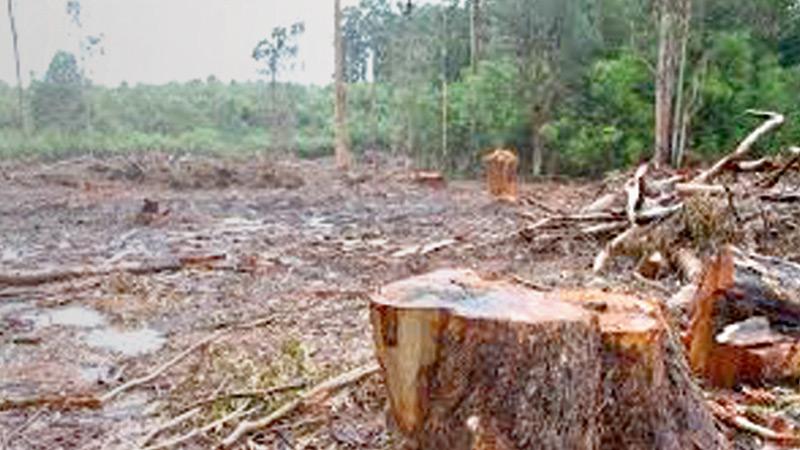
Sri Lanka, as a relatively small country, must protect the environment at all costs for the benefit of the future generations. The current major issues such as, deforestation, degeneracy of soil and wetlands, water and air pollution and waste management must be managed urgently with a carefully designed and sustainable plan prepared by obtaining expert opinion combined with technology. Prevailing major issues would cause irreparable damage if not addressed promptly.
In his manifesto, President Rajapaksa has clearly and emphatically indicated his vision and policy on this important matter covering the most significant areas such as land, ocean, industries, waste management, biodiversity and environmental education. The public having witnessed the President’s unyielding perseverance in this short span of time, believes that he will take every possible action to manage the prevailing environmental issues.
Deforestation, a permanent destruction, is in the forefront of Sri Lanka’s major issues related to environmental pollution. A vast amount of data has been presented by various institutions about the alarming rate of the reduction of primary forest and tree cover which currently is as low as 27% of the total land area. It is a fact that a few decades ago, this was three times more. Deforestation is the main cause for many prevailing environmental issues in Sri Lanka which needs a sustainable permanent solution immediately. Despite various plans and projects by consecutive Governments since independence, deforestation takes place and the forest cover keeps on diminishing. It is a proven fact that destroying tropical forests undermines the quality of life, is a threat to climate, a menace to the existence of species, damages bio diversity and many other natural resources. Therefore, the authorities must closely examine the effects of the environment and the consequences of the loss of forest and tree cover. The irony is that despite efforts by the authorities, environmentalists and concerned citizens, illegal tree felling in many areas is taking place throughout the country.
It is no secret that this despicable action invariably takes place with the auspices of corrupt politicians in the area. The active involvement of media institutions, especially, the television revealing such nefarious activities is a positive measure and a results oriented trend.
The new Government’s policy of a corruption free country and the clearly visible attitude of the President towards dishonesty is a distinct hope for the public.
Loss of trees and other vegetation is one of the major reasons for other environmental hazards such as climate change, soil erosion, flooding, increase of greenhouse gases and a host of other problems.
Therefore, stringent measures must be taken to curb the menace. The public has placed its trust explicitly on President Rajapaksa and believe that he will take swift and stern action against perpetrators for this heinous crime against nature.
Haphazard domestic waste dumping is another significant environmental pollution issue in urban areas and among rural societies to a lesser degree. There are two major factors causing this. Primarily, the failure of the local authorities to manage such issues due to various reasons and secondly the attitude of the public on the proper disposal of their garbage.
A staggering tonnage of domestic garbage is created daily throughout the country. There is clearly no motivation by the public to find solutions other than to completely rely on the local government authority that collects and disposes their garbage. The general attitude is that they blame everybody else other than themselves whenever there are delays. As per the new Government’s policy, action should be taken to minimize waste generation and search and introduce modern techniques of recycling. In addition, action must be taken to control the menacing problem of plastic waste, particularly in coastal areas.
Water pollution is another serious issue the country faces. Water in the urban areas are heavily polluted mainly due to the disposal of domestic sewage and industrial waste. Similarly, in rural areas water runoff due to agricultural activities also contaminates ground water causing problems to the atmosphere. In addition, the dumping of waste from ships as well as coral and sand mining produce marine pollution. Although there are regulations to control and manage water pollution in general, its enforcement clearly displays drawbacks due to various influences, particularly political. On the other hand, the lack of public concern about the natural environment is also a major reason for water pollution. Turning domestic sewage and waste water to rivers and other water resources is one of the most hazardous practices carried out by people living in the vicinity of rivers, lakes and other water resources.
The pertinent question here is whether adequate public awareness had been undertaken to educate the public except on the rare occasions of television footage on police action against persons or a commercial establishment that has violated the related law. The relevant authorities and the media with the assistance of environmental organizations must make a collective effort to make the general public aware of the damage they cause to nature knowingly or unknowingly.
In Sri Lanka, there are several institutions with adequate legal empowerment to act on environment linked illegal activities. The Central Environmental Authority, the Department of Forest Conservation, Department of Wildlife Conservation, Department of Coast Conservation and the Geological Survey Department are some of them. However, it is prudent to inquire whether these organizations are active enough at present and whether they make a genuine effort to curtail illegal activities reported almost daily in the main stream media.
The policy of the present Government is quite clear. As discussed earlier in the article, the President has not only laid down his policies but also every one of them is set up to be on par with modern world trends. If the President and the Government provide freedom to the authorities without political hindrance, and empower them to take necessary action, the future generation can dream of a pollution free country.
